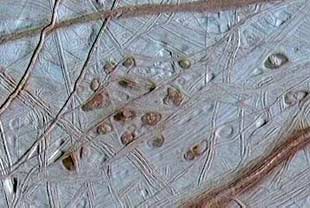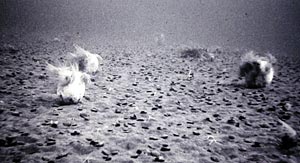The demand was strengthened in light of the discovery of life in isolated underground lakes in Antarctica
 The reddish ellipses in the center of the image may be areas where Europa's subsurface ocean water erupts and freezes on the surface (photo: NASA's Galileo spacecraft).
The reddish ellipses in the center of the image may be areas where Europa's subsurface ocean water erupts and freezes on the surface (photo: NASA's Galileo spacecraft).
While NASA and the European Space Agency are focusing on sending all-terrain vehicles to Mars and future missions that will look for life on its surface, a nucleus of scientists is beginning to form who want to establish a lobby that will direct attention to the place where they think there are reasonable chances of finding life - the icy moon of Jupiter - Europa.
"Due to the already proven presence of water ice on Europa and the possibilities of the existence of salty oceans, Europa has become a prime target for the search for life in the solar system," says geologist Jer Lips, professor of integrative biology at the University of California, Berkeley. "Many of us hypothesize that there is a habitat where we can find signs of life".
Lips shares the requirement with three other scientists. All gathered at a panel held on February 18, 2007 at the annual meeting of the American Association for the Advancement of Science in San Francisco. The group reviewed everything known so far about Europa and focused on the problems that needed to be solved before conducting a search for life on the frozen moon.
"In light of the experience we have gained in research in the Arctic and Antarctic ice, Lips said, "we see in what strange places life can thrive and also about the process that can bring life under the ice to the ground. This is relevant because Europa, Jupiter's third largest moon, contains an estimated ocean of water covered by a layer of ice several kilometers deep.
"If life survives in ice, it wouldn't be surprising," said Lips, whose interest in single-celled organisms made him decide to look for life on other planets, which would be more similar to bacteria than to humans. "In Antarctica, the entire system of the living world, the protozoa - bacteria and animals, live in the ice, many of them in salty channels that do not freeze. Beneath the ice at a depth of 50 meters in the Antarctic are sponges, sea lilies, clams, snails, fish and many micro-organisms that thrive in this frozen environment.
 The website Universe Today states that if the space agencies start already now, it will be possible to launch a spacecraft that will reach Europe in about 15 years.
The website Universe Today states that if the space agencies start already now, it will be possible to launch a spacecraft that will reach Europe in about 15 years.
Beneath the ice at a depth of 50 meters in the Antarctic are sponges, sea lilies, clams, snails, fish and many micro-organisms that thrive in this frozen environment. Photo by Ger Lips, University of California at Berkeley

5 תגובות
believe me! Why would there be life on ice and only ice, there is no oxygen there and there is almost no condition that exists on Earth for almost life even if there is life on a planet that is not Earth it will only be Mars (not special life on Mars) that humans will move to Mars because Earth (it is not It makes sense that this will happen because we don't have enough advanced technology and it will happen in another ten years) will not withstand the warming and it will all be flooded with water that today is glaciers. hahaha live on europe!
You know what, if there really is life on Europa, how can you explain the people who claim to have been abducted by aliens, or that the Zilzis come from the solar system, or that they have broken the laws of physics that we are subject to, such as the maximum speed is the speed of light, or that they use dark matter as fuel, this allows for staying in Finally in space or they built anti-graviton devices every body in the world emits graviton particles which pulls us to the ground and will allow 8 times faster flight into space
These scientists fell on their heads.
The chance of finding life on Europa tends to zero or less.
The condition for creating life is completely different from the conditions on Europe.
So stop talking nonsense.
The arrival of a spaceship there will cause it irreversible infectious damage.
So they will look to spend money on other projects.
I hope that there are enough smart scientists who will not be tempted by this kind of crazy adventures.
Are they looking for life on Europa's moon?
Let them search for my life first.
If they discover a life in me they will tell me. Because I don't know what kind of life I have.
I was there. There really is life there. But very cold and expensive. I don't think it's justified...